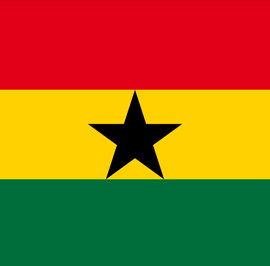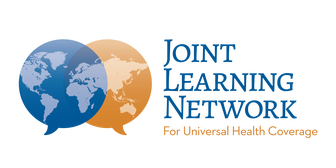
Ghana
Year Joined: 2003 | Membership: Full Member
Achieving financial sustainability.
In 2004, Ghana embarked on a process of developing and implementing a National Health Insurance Scheme to replace out-of-pocket fees at point of service.

Vivian Addo-Cobbiah (Mrs.)
Deputy Chief Executive, Operations

Anthony Ofosu
Deputy Director-General, Ghana Health Service
From the Health Policy of Ghana, Ghana’s approach to achieving UHC is to improve financial access and geographical access to health care. The approach to ensuring financial access is the National Health Insurance, while community-based planning and health services (CHPS) with improved referral is being used to address geographical access to health services.
The National Health Insurance Authority (NHIA) was established under the National Health Insurance Act 2003, Act 650 to help address financial access and facilitate the attainment of UHC in Ghana. The NHIA membership is open to all citizens and persons resident in Ghana. Poor and vulnerable in society are identified and registered under the National Health Insurance and old membership for this group are renewed as well. Out of a total of 17.2 million (55%) active members reached in 2022, 2.1 million of these were the poor and vulnerable. A short code (*929#) has been developed to register and renew membership. This will ensure that the hard-to-reach areas are not left out all in efforts to achieve UHC.
Empanelment is at the core of Primary Health care and UHC as well since community members need to be identified before care can be delivered proactively. The 2022 Health Summit was themed “Strengthening Ghana’s Health Information System for Tracking Universal Health Coverage (UHC)” The Empanelment deals with identifying community members individually, assessing them, and assigning and caring for them with a digital record of the process. Empanelment will facilitate the identification of these vulnerable community members and help identify members who need urgent, continuous care. The data generated on community members during the identification, assessment, and care-provision phases of empanelment will feed into Ghana’s Health Information Management System and facilitate the tracking of progress toward Universal Health Coverage.
Ghana’s current policy towards improving geographical access to achieve Universal Health Coverage (UHC) is the promotion of Networks of Practice. This will create health services as networks and by this; school-based infirmaries, work-based infirmaries, CHPS Zones, and health centers will form a network of practice at the sub-district level. Empanelment will support these Networks of Practice to identify and assign community members to care teams within the Network.
Ghana is one of the founding members of the JLN. Members from Ghana contributed to the following knowledge products:
- Domestic Resource Mobilization Collaborative Knowledge Products
- Strategic Communications for Universal Health Coverage: Guide and Toolkit
- Assessing Health Provider Payment Systems: Analytical Team Workbook
- Determining Common Requirements for National Health Insurance Information Systems
- Engaging the Private Sector in Primary Health Care to Achieve Universal Health Coverage: Advice from Implementers to Implementers
- Financing and Payment Models for Primary Health Care: Six Lessons from JLN Country Experience
- Health Priority Setting: A Practitioner’s Handbook
- Health Priority Setting and Resource Allocation (HEPRA) Tool and Database
- Measuring Health System Efficiency in Low- And Middle-Income Countries: A Resource Guide
- Measuring the Performance of Primary Health Care
- Primary Health Care Measurement for Improvement Indicator Inventory
- Provider Payment Mechanisms Podcast
- Strategic Communication for Universal Health Coverage: Planning Tool
- Strategic Communication for Universal Health Coverage: Practical Guide
- Universal Health Coverage Primary Health Care Self-Assessment Tool
- Using Data Analytics to Monitor Health Provider Payment Systems
- Using Health Data to Improve Universal Health Coverage: A Companion Guide for Assessing Data Use Maturity
- Using Health Data to Improve Universal Health Coverage: Three Case Studies
- Toolkit for Medical Audit Systems: Practical Advice from Implementers to Implementers
- UHC Primary Health Care Self-Assessment Tool (our records indicate this was used twice, once in 2014 and once in 2018)
- Determining Common Requirements for National Health Insurance Information Systems
- Open Health Data Dictionary
- Data Analytics for Monitoring Provider Payment Systems
- Assessing Health Provider Payment Systems: A Practical Guide for Countries Moving toward UHC
